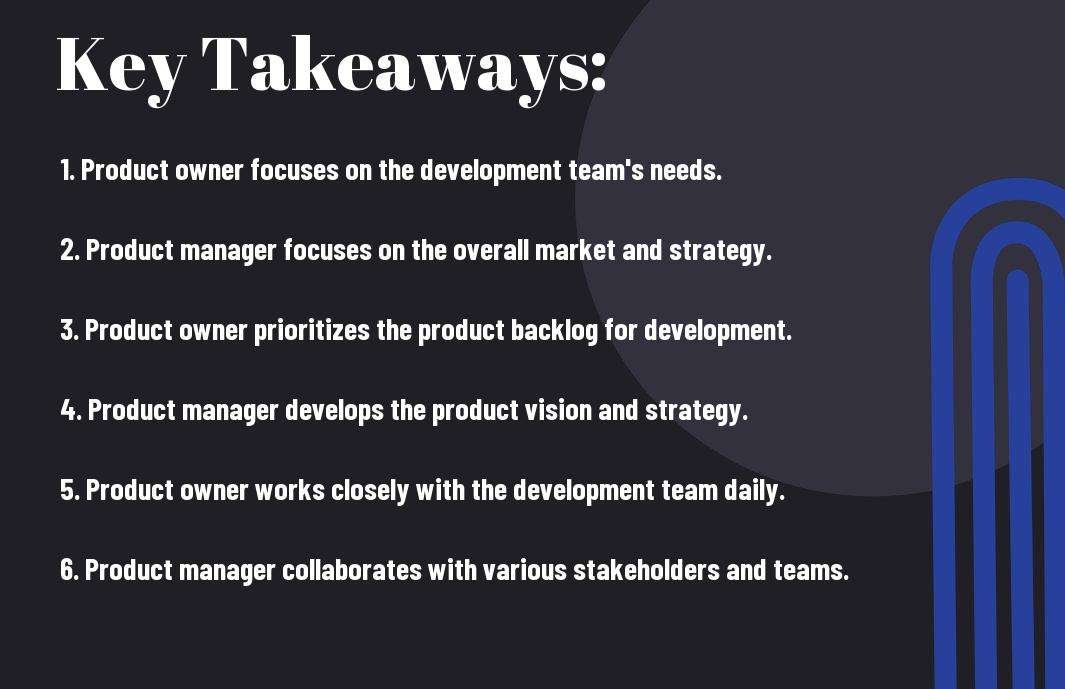Many find themselves puzzled by the roles of a Product Owner and a Product Manager in product development. Let me guide you through the intricacies of these positions, clarifying the distinctive responsibilities each holds. Understanding these differences is vital for a successful product strategy and development process. So, let’s research into the vital dissimilarities between a Product Owner and a Product Manager to help you navigate these roles effectively.
Key Takeaways:
- Focus: Product Owners focus on the development team and the execution of the product roadmap, while Product Managers focus on the overall product strategy and ensuring alignment with business goals.
- Responsibilities: Product Owners are involved in daily operations such as backlog management, sprint planning, and user stories, while Product Managers are responsible for market research, defining the product vision, and making strategic decisions.
- Scope: Product Owners typically work more closely with the development team and have a more tactical role, whereas Product Managers have a broader scope that includes market analysis, customer feedback, and long-term product planning.
Roles Overview
While both the Product Owner and Product Manager play critical roles in product development, they have distinct responsibilities and focus areas. Understanding these key differences is necessary for effective collaboration and successful product delivery.
Product Owner: A Brief Description
One of the necessary roles in Agile development is that of the Product Owner. As a Product Owner, you are primarily responsible for defining and prioritizing the features of the product. It is your duty to represent the customer’s voice and ensure that the development team is working on the most valuable tasks first.
Product Manager: A Brief Description
An integral part of the product development process is the Product Manager. As a Product Manager, you have a broader scope of responsibilities compared to the Product Owner. You are responsible for the overall success of the product, from its conception to launch and beyond. Your focus extends beyond the development phase to include market research, strategy, and product positioning.
Another crucial aspect of the Product Manager’s role is strategic planning and market analysis. You are expected to have a deep understanding of the market, competition, and customer needs to make informed decisions that drive the product’s success.

Responsibilities
Product Owner’s Key Responsibilities
Little did you know, the responsibilities of a Product Owner are pivotal in ensuring the success of a product. According to What’s the difference between a product owner and …, the Product Owner acts as the voice of the customer, defining and prioritizing the product backlog, ensuring the team delivers value to the business. With a clear vision and constant collaboration with stakeholders, you, as a Product Owner, steer the product in the right direction, making tough decisions to maximize its value.
Product Manager’s Key Responsibilities
Little did you realize, while the Product Owner focuses on the ‘what’ and ‘why’ of a product, the Product Manager researchs into the ‘how’ and ‘when.’ Your role involves defining the product strategy, creating a roadmap, and aligning cross-functional teams to achieve product goals. For instance, your responsibilities may include market research, competitive analysis, and roadmap planning to ensure your product remains competitive and meets market demands.

Decision-Making Authority
Product Owner’s Decision-Making Scope
Owners, in Product Manager vs Product Owner, typically have authority over the product backlog prioritization, defining user stories, and ensuring the team delivers what the customer needs. They focus on maximizing the value of the product and making decisions that directly impact the development process. Product Owners collaborate closely with stakeholders, customers, and the development team to ensure a successful product delivery.
Product Manager’s Decision-Making Scope
Any Product Manager, on the other hand, has a broader scope of decision-making authority. They are responsible for the overall product strategy, roadmap, and vision that align with the company’s goals. With Product Managers overseeing market analysis, competitive research, and the entire product lifecycle, they make decisions that shape the product’s direction and long-term success.
With Product Managers having a holistic view of the product and its market, they often make decisions that have far-reaching implications beyond the immediate development cycle, influencing the product’s positioning, pricing, and overall success in the market.
Focus Areas
Many differences exist between the roles of a Product Owner and a Product Manager in terms of their focus areas. Let’s explore the unique priorities each role holds in a product development setting.
Product Owner’s Focus: Internal Stakeholders
Product Owners primarily focus on internal stakeholders such as development teams, scrum masters, and other departments within the organization. Your main responsibility as a Product Owner is to prioritize the product backlog, ensure the team understands the requirements, and make decisions that align with the company’s goals. This role requires a deep understanding of the project’s specifics and the ability to communicate effectively with cross-functional teams.
Product Manager’s Focus: External Stakeholders
Product Managers, on the other hand, concentrate on external stakeholders like customers, market trends, and competitors. Your role as a Product Manager involves market research, defining the product vision, and creating strategies to meet customer needs. You are the bridge between the product development team and the outside world, ensuring the product meets market demands and remains competitive.
With a Product Manager’s focus on external stakeholders, you are constantly analyzing market trends, gathering customer feedback, and adjusting the product roadmap to stay ahead of the competition. This role requires strong market research skills, strategic thinking, and the ability to adapt to changing business landscapes.
Skill Sets
Product Owner’s Essential Skills
One of the key roles of a Product Owner is to understand the market and the customer needs. To excel in this role, you need to have strong communication skills to effectively convey the product vision to the development team. Prioritization skills are crucial as you need to manage the product backlog efficiently and ensure that the most important features are developed first. Additionally, problem-solving abilities and a collaborative mindset are vital for overcoming challenges and working closely with stakeholders.
Product Manager’s Essential Skills
Owners of the product management domain have a broader scope, including strategic planning, market analysis, and cross-functional team leadership. You need to possess strong analytical skills to interpret market trends and customer feedback to make informed decisions. Project management skills are a must to coordinate various teams and ensure timely delivery of the product. Moreover, leadership abilities and business acumen are crucial for driving the product strategy and ensuring its success in the market.
Skills: While Product Owners focus on tactical implementation and direct interaction with the development team to ensure the product meets customer needs, Product Managers take a more strategic approach, overseeing the entire product lifecycle and aligning it with the company’s business goals. Both roles require a blend of technical knowledge, communication skills, and a customer-centric mindset to deliver successful products.
Collaboration and Communication
Product Owner’s Collaboration Style
Not only are you responsible for defining the product vision and roadmap, but as a Product Owner, your collaboration style is pivotal in ensuring the success of the product. You work closely with stakeholders, development teams, and customers to gather requirements, prioritize features, and ensure everyone is aligned on the product goals. Your ability to communicate effectively and build strong relationships is crucial in this role.
Product Manager’s Communication Approach
Product Managers, on the other hand, have a different approach to communication. Approach is more strategic, focusing on aligning the product strategy with the overall business goals. Product Managers often act as the bridge between various teams, translating the vision into actionable tasks for the development team. They also communicate with senior management to provide updates on the product’s progress and make strategic decisions based on market trends and customer feedback.
Another key aspect of a Product Manager’s communication approach is their adeptness at adapting their communication style to different audiences. Product Managers need to be able to communicate technical details with the development team, present high-level strategic plans to senior management, and engage with customers to gather feedback effectively.
Summing up
Ultimately, understanding the key differences between a Product Owner and a Product Manager is vital for clarifying roles within your product development team. As outlined in the article Product Manager vs. Product Owner: Who’s Who?, the Product Owner focuses more on the day-to-day execution of the product backlog and ensuring the success of the product, while the Product Manager takes a broader strategic approach, aligning the product with the overall business goals and vision.
By recognizing these distinctions and understanding the unique contributions each role brings, you can effectively leverage the skills of both a Product Owner and a Product Manager to drive your product development forward in a cohesive and impactful manner. Embracing the strengths of each role will help you optimize your product strategy and deliver exceptional products to your customers.
FAQ
Q: What are the main responsibilities of a Product Owner?
A: The Product Owner is responsible for defining and prioritizing the product features, creating and maintaining the product backlog, and collaborating with the development team to deliver the product.
Q: What are the main responsibilities of a Product Manager?
A: The Product Manager is responsible for defining the product strategy, conducting market research, analyzing competition, and ensuring the overall success of the product in the market.
Q: What is the main difference between a Product Owner and a Product Manager?
A: The main difference lies in their focus – while the Product Owner is more involved in the day-to-day development process and works closely with the development team, the Product Manager has a broader strategic focus and is responsible for the overall success of the product in the market.











